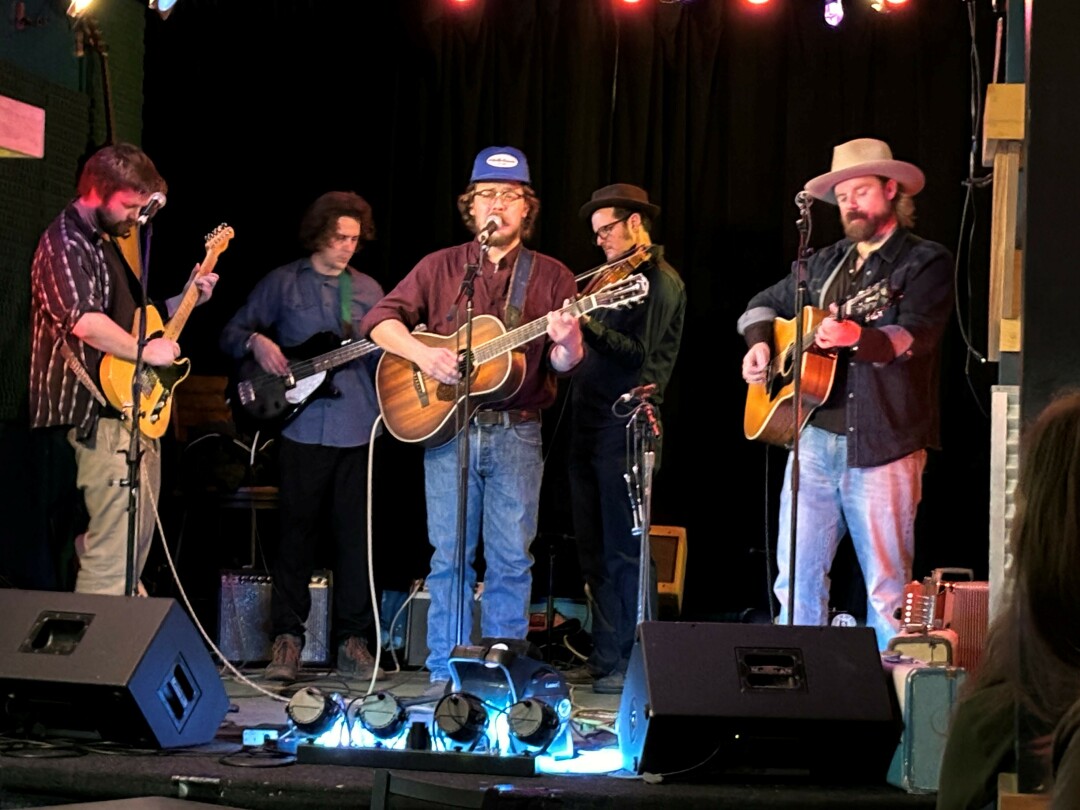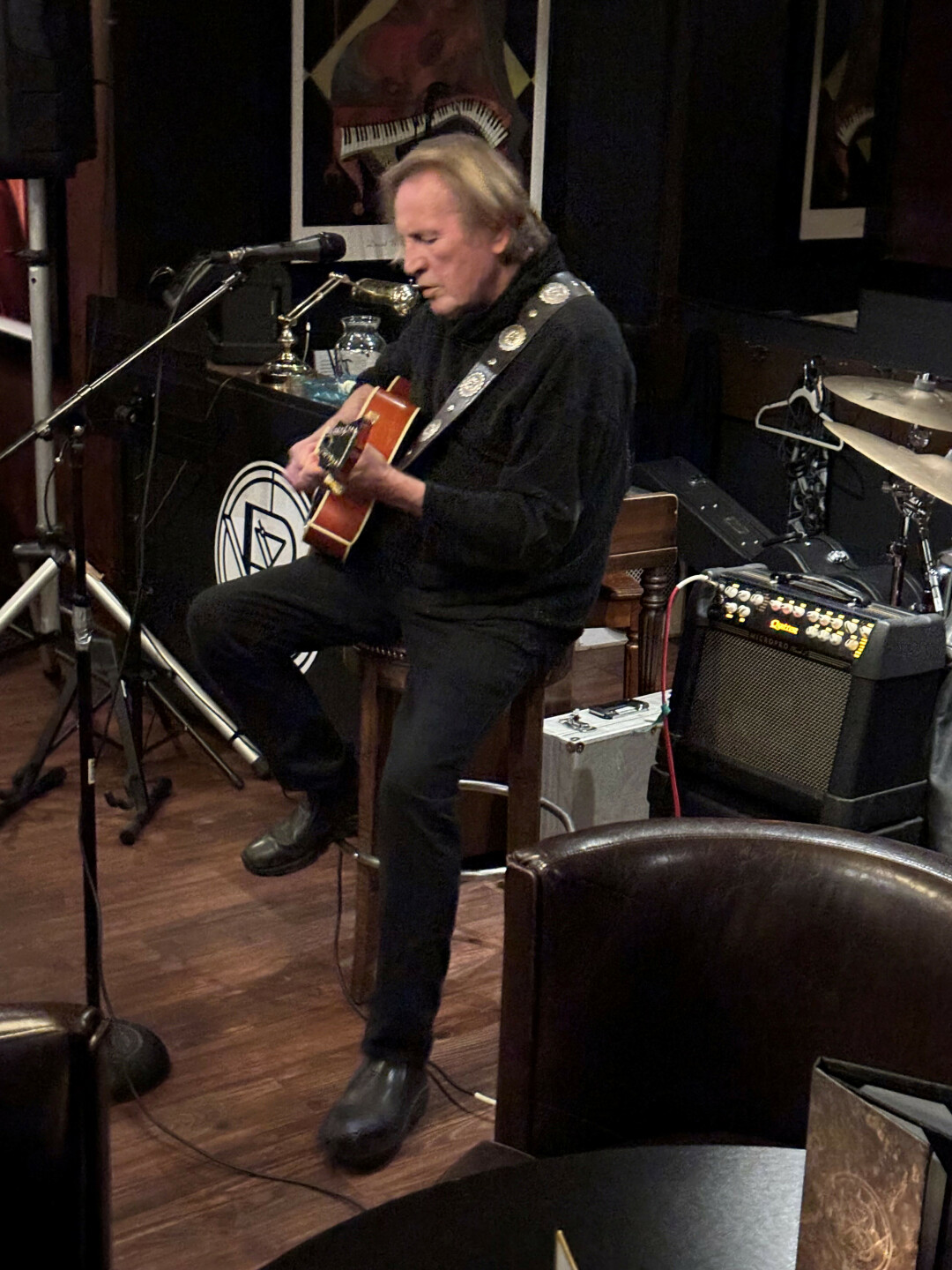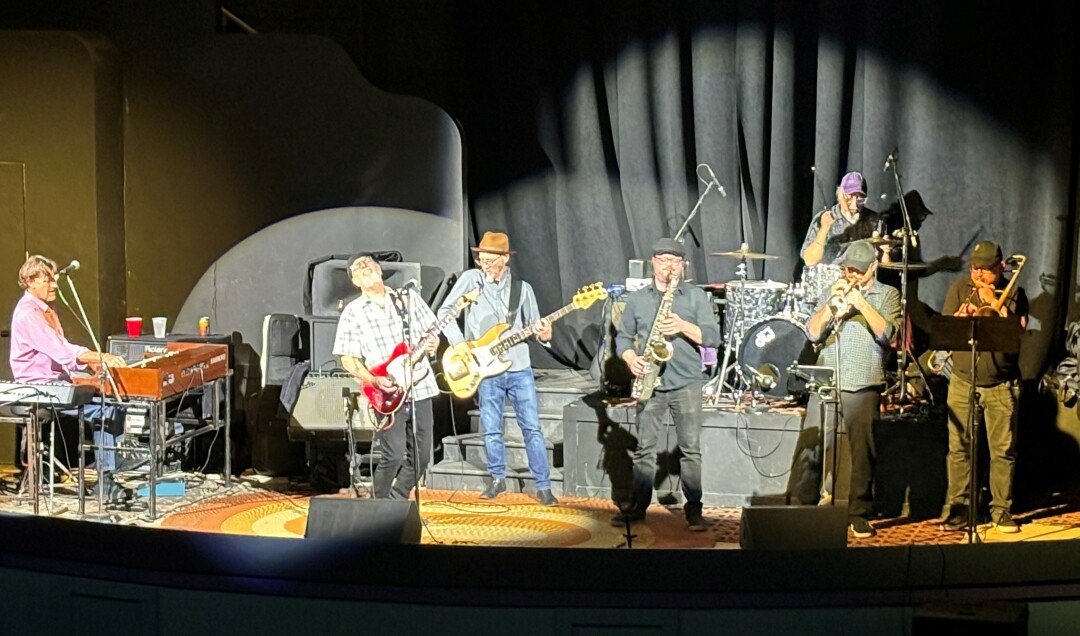News & Articles
Browse all content by date.

Matt Sayles and friends at Wussow's. Photo by Jill Fisher.
For the year and a half I have been writing this column, I’ve prioritized seeing bands and solo musicians I haven’t seen before in an attempt to catch up with the local music scene. This has kept me from revisiting acts that I’ve loved and previously written about or perhaps some II wasn’t all that enthralled with.
This past week has been different; I went to see three different groups with people I’ve not only seen and heard before but have written about.
A second visit to Blackwater Lounge on Nov. 8 together with Twin Cities bluesman, Kurt Koehler (Inside Straight band), to see Paul Metsa during his regular Wednesday evening residency, a week after his special birthday gig there, was pretty cool. The two of them have known each other “since the Civil War,” as Paul put it, so they had some catching up to do.
Their first conversation involved hearing aids! What kind, how they worked and whether they wore them while playing on stage (Koehler does, Metsa doesn’t). It’s a real issue for these older musicians who’ve been subjected to loud music for decades.
They shared stories of venues both had played, where they are based (Metsa singing the praises of living here in Duluth after years in the Twin Cities; Koehler reporting he’s a snowbird headed for Arizona in a few weeks) and what was in store for each of them.
Metsa spoke of his original composition “Jack Ruby,” how it was written overnight 30 years ago and was being re-released in November. The timing corresponds with a new three-part documentary,“JFK: One Day in America, being aired by National Geographic 60 years after JFK’s assassination on November 22, which could spur its widespread airplay.
Koehler assisted in fixing an equipment snafu that bombarded the bar’s clientele with sonic-level feedback.
When Metsa got underway, he began his set with a Leo Kottke instrumental, demonstrating his guitar-playing ability, and moved on to several old chestnuts, such as “Summertime.” Since he was solo, accompanying himself with acoustic guitar, it was something of a revelation to hear the nuance and expressiveness in his now somewhat gravelly voice.
During the birthday gig on Nov. 1, Metsa’s vocals were overshadowed by Sonny Earl’s hot harmonica and vocals, as well as by his invited musicians, Alan Sparhawk and Taylor Shykes. On this evening Metsa sang many of the same tunes as the week prior but also a more extensive selection of his own compositions, with lyrics clearly articulated. That always helps the listener appreciate a song that isn’t necessarily well-known.

Paul Metsa
Among these, in addition to “Jack Ruby,” were “Whistling Past the Graveyard,” “Spanish Bride” and “Virginia” (not “Virginia, Virginia” as I mistakenly reported in last week’s review).” His covers were good too, such as the Sonny Terry and Brownie McGhee song “Walkin’ My Blues Away” and the “Hobo’s Lullaby” associated with Woodie Guthrie but written by Goebel Reeves. (Full disclosure, he dedicated “She Belongs To Me” to jillybones, thank you very much!)
A request for the song, “The Wreck of the Edmund Fitzgerald” wasn’t able to be fulfilled; instead he ended his set with his own “Judas Sang the Blues.”
My takeaway was twofold: Metsa is worth a listen and it pays to give a performer more than one listen.
The second second chance was with The Jimmys at the West Theater the next night, Thursday, Nov. 9. Actually it was the third time I’d heard this band live, but only the second since I began this writing schtick. All three times were at the West and I was blown away the first time I heard them, back in 2021.
Last December 8 they were back in town, but I was much less impressed with that concert, though not particularly explicit in my review about being disappointed – maybe because of high expectations or because they didn’t seem as energetic as the first time.
However, this was not the case this past week when they burst onto the stage practically lighting it on fire with their first number, "Broke and Hungry" by Junior Wells. Led by Jimmy Voegel (keyboards), the 7-piece Jimmys includes regulars Perry Weber (electric guitar), Johnny Wartenweiler (bass guitar), Pete Ross (saxophone) and Chris Sandoval (drums). On this evening trumpeter Chad Wittinghill had replaced Mike Boman, who left the band right after Labor Day, and Matt Hanzelka (trombonist with the Belfast Cowboys) stood in for Joe Goltz.
The band was obviously having fun, which is nearly always a sign of a good concert. And this was in spite of some problem with the lights that left Weber in the dark during his first lead guitar numbers. Goofing with the brass threesome, he crowded over into their spotlight for a couple numbers until the problem was corrected. It was a great evening of good ol’ blues like “Wondering Where Love Has Gone,” rock and roll numbers, “Cruising Down the Road” in a mashup with “Let the Good Times Roll” along with some boogie woogie and slower blues pieces.

The Jimmys
There were just the right number of sax solos and instrumental jams with hot tunes that kept the place jumpin’. When all was said and done, The Jimmys performed 10 numbers in the first half, about six in the second, and three more in two separate encores (including “The Shape I’m In” and “Ophelia” by The Band) playing well beyond the advertised 10 pm end time. It seems everybody in the almost sold-out house was as thrilled with this year’s Jimmys concert, as I was.
Saturday evening, the 11th, provided several choices for second-time-around hearings, but there is just one of me so I went to Wussow’s for one I had been invited to quite a while beforehand. (Had to skip the Haley album release concert at Sacred Heart Music Center, of which I heard widely varying opinions.)
It was Matthew R. Sayles together with musician friends from here, Eau Claire, Wis., and the Upper Peninsula of Michigan on the Wussow’s stage. Having heard Matt on several occasions with fellow artists like Misisipi Mike Wolf and with his Driftless Revelers band, not to mention on three of his CDs, I was intrigued that he was back in town with a mix of folks that seemed to promise he would reveal another side to his music.
In addition to a second helping of Matt, I got to hear Eau Claire-based Wyatt Thomson again. He opened for the Driftless Revelers at Earth Rider festival grounds this past summer on a chilly June 16 evening (reviewed in the June 22 Reader). Wow, he impressed me even more in the intimate venue that is Wussow’s. He has a very pleasant, not overly nice, tenor voice, singing several solos including both classics (“Long Black Veil,” “Unchain My Heart”) and wonderful original tunes (“OK By Me,” “Why Should I Worry?” and “Gasoline and Cigarettes”). Then he played his original “Home” on his Fender Telecaster for the first time; it was an eerie-sounding number with unexpected, unsentimental lyrics that included the refrain, “…I don’t wanna go home.” Duluth’s own Clancy Ward on fiddle and Sayles on acoustic guitar joined Thomson for several songs.
Ray Little from the U.P. was next up on stage. Unlike the others, he was new to me. His songwriting is what he is best known for. His lyrics are quirky, but engaging – “McGregor,” “Days With My Dog,” “Philville” and “Maybe You Just Drank Too Much” which Sayles joined in on, playing a squeeze box. “You Can Do Both” explained that a man can still be macho and still “give a fuck.”
Later, Matt, the ringleader of this crew, soloed on several original songs before being joined by others. One of his I hadn’t heard before was written quite a while back when he was living on the West Coast: “Breathing Smoke” is about forcing convicts to put out California wildfires. It was a potent protest song that highlighted the predicament of these humans who put their lives on the line “…breathin’ smoke, diggin’ trench and haulin’ gear.” Sayles has a fine finger-pickin’ style along with a voice that does justice to these songs, beyond the funny “hokum” the Revelers produce.
Guitarist Ben Nelson, another of the members of the Driftless Revelers from Eau Claire, was the last to join in as the evening went on with some lead vocals of his own and a bit of rowdiness one expects from that group. It was rather a shame that more folks weren’t there to enjoy the variety of music by these talented guys.
At the last minute, I read that a brass quartet called The Westerlies were to perform at the Pilgrim Congregational Church, as one of this year’s four concerts arranged by Matinee Musicale. The New York City-based quartet was made up of two trumpeters, Riley Mulherkar and Chloe Rowlands, and two trombonists, Andy Clausen and Addison Maye-Saxon, all of whom have been friends since their childhoods in the Seattle area. I can hardly believe I have never been to any of the concerts arranged by this organization since it was established in 1900!
But the concert sounded intriguing so I thought, what the heck, let’s see what it’s all about. Well, I was in for a real revelation, as were many in the large audience in attendance. The surprise was the atypical brass music performed—the foursome opened with their rendition of “Shape Note Hymns.” (Shape note music originated in 18th century England that uses a notation method designed to facilitate congregational and social singing for those without musical training. At the concert’s outset it was announced that there’s a shape note singing group here in Duluth! If interested you can find out about it on Facebook.)
The music the Westerlies produced has been described as “arty.” I found it to be jazz-like with its improvisational interludes. Three original compositions – one each composed by Rowlands, Mulherkar and Clausen – were inspired by shape note singing. Other selections were new takes on gospel and traditional hymns. The final number, “Sara” was based on an old English folk tune, though in their version, it didn’t sound like that. The two trombones were different types, which Addison explained to me after the concert: His was an “orchestral trombone” with an F-flange that allowed for a lower range of notes, while Clausen’s was the more typical “pea-shooter” type, with narrower tubing. Between the two of them, there was a fair amount of almost cartoon-like movement on stage.
My escort, the Curmudgeon, opined that the sound this quartet created was unique and astounding. Part of Matinee Musicale’s mission is to bring important emerging artists from larger centers of music, such as New York, to our community.
When one considers the history of Duluth, with its boom time around the turn of the 20th century, it makes sense that the burgeoning upper class, many of whom had connections to East Coast population centers, would want to bring their culture to the hinterland of Duluth.
Nowadays Matinee Musicale’s concert season consists of four chamber music performances. This concert was the second of the 2023-24 season. The final two will be the Balourdet [string] Quartet on Sunday, Jan. 28, at Pilgrim Congregational Church and then pianist Kenny Broberg on Tuesday, March 5, at Weber Music Hall on the UMD campus. Find out more about this venerable organization online at matineemusicale.org.
And before I forget it, I should mention a new local band has been formed: Triple Check. It’s a country-rock trio with two guitarists – Russ Sackett and Tony Don Tracy (bass) and Marvin Pomeroy on drums. More about them in the future. In the meantime, maybe I’ll see you at the Christmas City of the North Parade this Friday, Nov. 17, where we’ll be treated to some seasonal music (if you can stand it!).
| Tweet |

